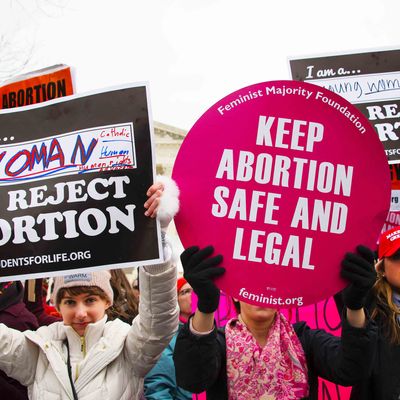
Reproductive rights in the U.S. are under threat, as states continue to pass laws that restrict access to abortion and the president supports overturning Roe v. Wade. In response to the threat, a Netherlands-based advocacy organization is launching an online service this week to help women safely use self-inducing medication at home, the Washington Post reports.
The online service, from abortion group Women Help Women, provides one-on-one counseling services to women seeking to terminate their pregnancies. By accessing the website Abortionpillinfo.org (which launches on Thursday), women can send a secure message to counselors overseas, and within a few hours, they’ll receive a response that relies on World Health Organization guidance, Kinga Jelinska, executive director of Women Help Women, told the Post.
Currently, the abortion pill is only available legally in the U.S. through prescription, though the Post notes it can also be purchased illegally online or through other countries. The abortion medication approved by the Food and Drug Administration involves two drugs taken in combination through the first ten weeks of pregnancy, ingested during the course of 24 to 48 hours to induce miscarriage. As the Post reports, the FDA cautions that the pills shouldn’t be purchased online due to safety concerns, and the agency also recommends they be taken under medical supervision.
Women Help Women’s new service is not intended to help women get the drugs but instead is an “information-delivery project,” according to Jelinska. There is a disclaimer at the bottom of the site that says it is not a substitute for medical advice. And while the three-year-old group provides a different version to women across the world, organizers opted to launch the new service in the U.S. because of the current political climate.
“There is a lot of fear and worry that, with the current administration and restrictions that are to the enormous disadvantage of girls and women, that access to clinical care might further diminish,” Jelinska told the Post.
According to the Guttmacher Institute, nearly half of all abortions before nine-weeks gestation in the U.S. in 2014 were medically induced, in addition to almost a third of all non-hospital abortions across the country. Anti-abortion groups argue that the use of these drugs is unsafe and results in death or injury. However, abortion-rights advocates cite a 2015 study that found side effects from the drug are rare — an analysis of over 11,000 medical abortions in California only found major complications in 0.31 percent of cases, according to the Post.
But although advocates argue the drug is relatively safe, the legality of self-induced abortion in the U.S. is still “unsettled.” The Post notes that while in 2015, the Ninth Circuit Court of Appeals found that an Idaho law that made it illegal for women to perform their own abortions violated Supreme Court precedent, several states still have laws that criminalize self-induced abortion and some women and people who have helped with the procedure have been prosecuted under criminal statutes.





